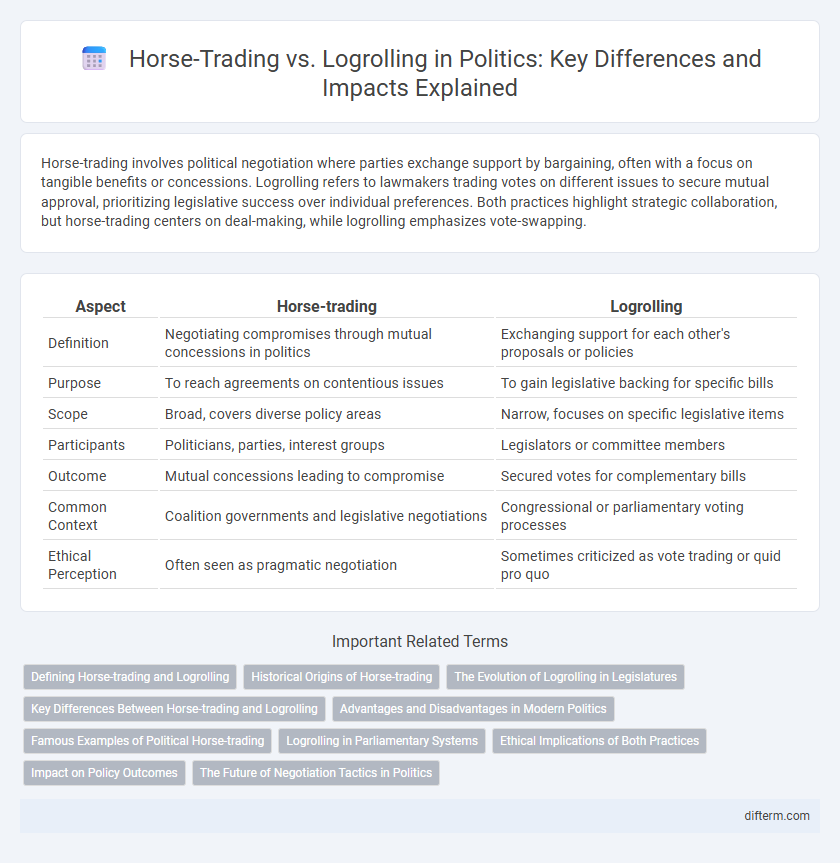Horse-trading involves political negotiation where parties exchange support by bargaining, often with a focus on tangible benefits or concessions. Logrolling refers to lawmakers trading votes on different issues to secure mutual approval, prioritizing legislative success over individual preferences. Both practices highlight strategic collaboration, but horse-trading centers on deal-making, while logrolling emphasizes vote-swapping.
Table of Comparison
| Aspect | Horse-trading | Logrolling |
|---|---|---|
| Definition | Negotiating compromises through mutual concessions in politics | Exchanging support for each other's proposals or policies |
| Purpose | To reach agreements on contentious issues | To gain legislative backing for specific bills |
| Scope | Broad, covers diverse policy areas | Narrow, focuses on specific legislative items |
| Participants | Politicians, parties, interest groups | Legislators or committee members |
| Outcome | Mutual concessions leading to compromise | Secured votes for complementary bills |
| Common Context | Coalition governments and legislative negotiations | Congressional or parliamentary voting processes |
| Ethical Perception | Often seen as pragmatic negotiation | Sometimes criticized as vote trading or quid pro quo |
Defining Horse-trading and Logrolling
Horse-trading in politics refers to the intense negotiation process where legislators trade support on various bills or policies to achieve mutual benefits, often involving complex compromises and deal-making. Logrolling specifically involves the exchange of votes by legislators to secure support for each other's proposed legislation, typically aiming to advance local or special interests. Both practices are fundamental to legislative strategy, enabling coalition-building and policy approval within political institutions.
Historical Origins of Horse-trading
Horse-trading originated in the early 19th century as a metaphor for intense political bargaining characterized by strategic negotiation and mutual concessions, particularly during legislative deal-making in the United States. This term draws from the literal practice of horse traders, who negotiated aggressively to secure advantageous terms, symbolizing complex negotiation tactics among politicians. Unlike logrolling, which involves reciprocal voting arrangements, horse-trading emphasizes broader, often multi-issue negotiations that rely on skillful persuasion and compromise.
The Evolution of Logrolling in Legislatures
Logrolling in legislatures has evolved from simple vote trading to complex coalition-building strategies that enhance legislative efficiency and policy negotiation. Unlike traditional horse-trading, which often involves straightforward quid pro quo exchanges, modern logrolling incorporates multifaceted agreements spanning multiple bills and diverse interest groups. This evolution underscores the role of strategic interaction and reciprocity in shaping legislative outcomes and facilitating consensus among polarized lawmakers.
Key Differences Between Horse-trading and Logrolling
Horse-trading involves negotiation and compromise between politicians to gain support for mutually beneficial policies, often emphasizing direct bargaining and give-and-take tactics. Logrolling specifically refers to the practice of exchanging favors by trading votes on legislation, where lawmakers agree to support each other's bills to advance their respective agendas. The key difference lies in horse-trading's broader negotiation scope, while logrolling is narrowly focused on reciprocal vote trading within legislative processes.
Advantages and Disadvantages in Modern Politics
Horse-trading and logrolling both play pivotal roles in modern politics by facilitating negotiation and coalition-building, yet horse-trading's advantage lies in its flexibility and personalized deals, allowing politicians to secure specific, mutually beneficial agreements. However, its discretionary nature can lead to opaque decision-making and potential corruption, while logrolling's practice of mutual vote trading promotes legislative efficiency by enabling the passage of multiple bills simultaneously. The downside of logrolling includes the risk of promoting less meritorious policies simply to secure votes, undermining the quality of legislation in pursuit of political compromise.
Famous Examples of Political Horse-trading
Political horse-trading involves negotiation and compromise between lawmakers to achieve mutual benefits, often seen in the passage of complex legislation such as the U.S. Affordable Care Act. A famous example includes the 1820 Missouri Compromise, where Northern and Southern legislators agreed to balance slave and free states to maintain sectional peace. Another notable instance is the 1965 Voting Rights Act, shaped by behind-the-scenes deals to secure bipartisan support for civil rights reforms.
Logrolling in Parliamentary Systems
Logrolling in parliamentary systems involves legislators exchanging support for each other's proposals to secure mutual legislative benefits, often leading to coalition-building and policy compromises. It facilitates consensus in multiparty parliaments where no single party holds a majority, enabling smoother law-making processes through negotiated agreements. Unlike horse-trading, which may imply overt bargaining, logrolling is often institutionalized within parliamentary procedures to maintain stability and governance efficiency.
Ethical Implications of Both Practices
Horse-trading and logrolling, two common political negotiation tactics, raise distinct ethical concerns related to transparency and accountability. Horse-trading often involves opaque deals that can undermine public trust by prioritizing personal or party gain over the common good. Logrolling, while sometimes seen as mutual support or coalition-building, risks promoting policies based on quid pro quo arrangements rather than merit or public interest.
Impact on Policy Outcomes
Horse-trading involves negotiators exchanging goods or favors, often resulting in fragmented policy outcomes driven by individual interests rather than coherent public goals. Logrolling, characterized by mutual voting agreements among legislators, can facilitate the passage of broader legislation but sometimes leads to inefficient or pork-barrel spending. Both practices shape policy outcomes significantly, with horse-trading emphasizing personalized deals and logrolling fostering coalition-building to secure legislative success.
The Future of Negotiation Tactics in Politics
Horse-trading and logrolling remain pivotal negotiation tactics in modern politics, shaping legislative outcomes through strategic vote trading and deal-making. The future of negotiation tactics will likely integrate digital platforms and data analytics to enhance transparency and efficiency in coalition-building. Political actors are increasingly leveraging these tools to anticipate opposition moves and foster bipartisan agreements.
Horse-trading vs Logrolling Infographic

 difterm.com
difterm.com